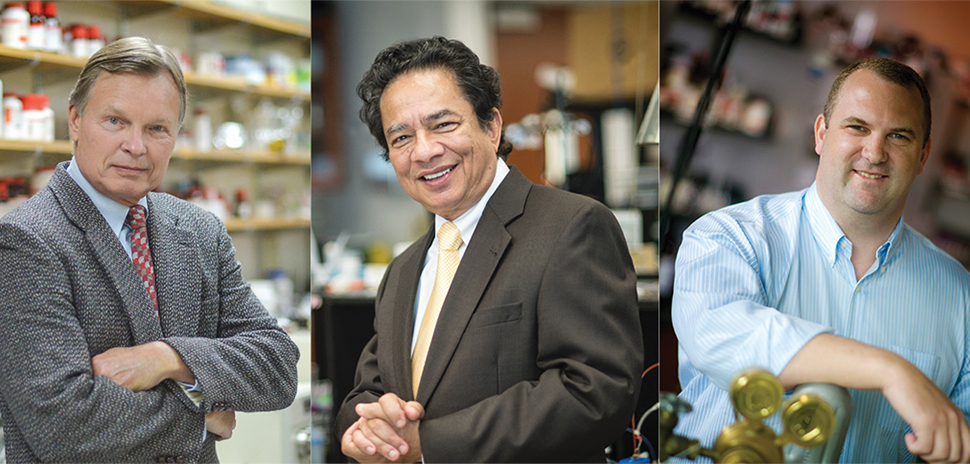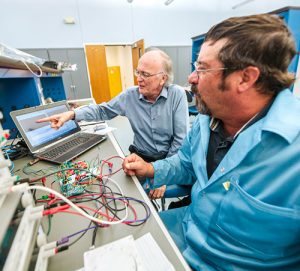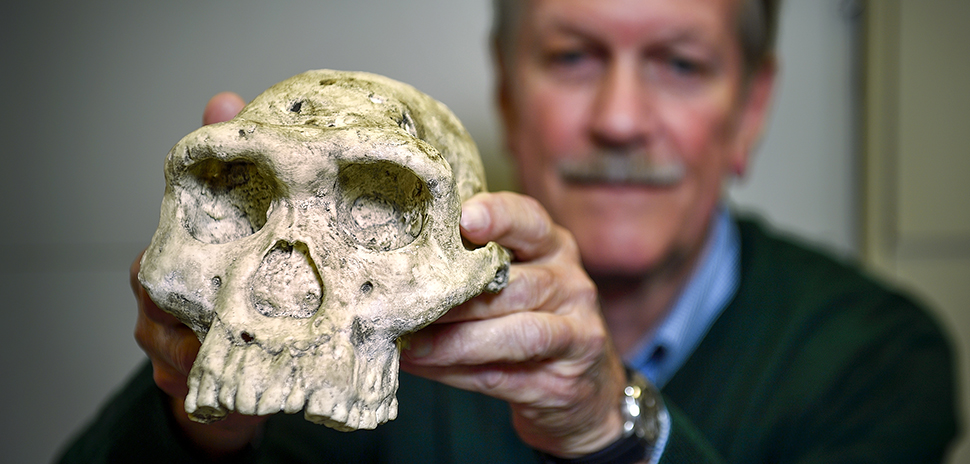![]() Every week, we do a little research of our own. We’re looking for scientists, professors, engineers, entrepreneurs—anybody, really—engaging in research and development across North Texas.
Every week, we do a little research of our own. We’re looking for scientists, professors, engineers, entrepreneurs—anybody, really—engaging in research and development across North Texas.
There’s plenty of good work being done. If you want to put R&D under your microscope, sign up for our e-newsletter.
UNT prof helps with a breakthrough in identifying ancient fossils
There’s one thing we all know about fossils—they’re really old, with some dating from a million years ago or longer. What hasn’t been clear about fossils over a million years old, though, was whether those creatures were male or female and exactly what species of animal they were. Until now.
Reid Ferring, a professor in the University of North Texas’ Department of Geography and the Environment, is part of an international team of scientists that has developed a breakthrough method of identifying the sex and species of animals in fossils more than a million years old.
READ NEXT Discovery: UNT Raises $2.3M for Research Portal; UTD Adds Faculty to Build on Emerging Areas
“This is very exciting because our current method for determining sex and species, examination of extracted DNA, was limited to approximately 200,000 years. Through palaeoproteomics, the study of ancient proteins, we can now look back over a million years,” Ferring said in a statement.
Palaeoproteomics is a new field involving the analysis of sets of proteins to ancient materials, ranging from mineralized tissues such as bone and teeth to soft tissues such as hair and skin. Ferring thinks that the field will be key in establishing the evolutionary line between the earliest hominids and modern man, according to a statement.
That’s because, Ferring says, proteins such as collagen, which is found in tendons, ligaments, skin, bone, and teeth, last far longer than DNA in fossilized material.
“We have thousands of hominid fossils in collections and museums around the world from all time periods,” he says. “We have five complete skulls from the Dmanisi site in the country of Georgia that I know are almost 2 million years old. There are so many samples that can now be labeled and differentiated between species of the same line. We are on the edge of learning much more about our ancestors and ourselves than at any point in history.”
The team’s breakthrough came when members were able to sample collagen from 1.7 million-year-old fossilized animal teeth found at the Dmanisi site. With that protein, the team was able to determine that the animal was a Stephanorhinus, an extinct type of rhinoceros. That allowed the team to fit the Stephanorhinus into the modern rhino’s evolutionary line and differentiate it from ones that came before and after, according to a statement.

UTA chemistry professors Daniel Armstrong, Purnendu “Sandy” Dasgupta, and Kevin Schug. [Photo: Courtesy UT Arlington]
Three UTA chemists ranked among world’s top 100 scientists
The Analytical Scientist has recognized three professors from the Department of Chemistry in The University of Texas at Arlington’s College of Science on its 2019 Power List, placing them among 100 of the top scientists in the world.
The three chemists are Daniel Armstrong, Robert A. Welch Distinguished Professor; Purnendu “Sandy” Dasgupta, the Hamish Small Chair in Ion Analysis; and Kevin Schug, Shimadzu Distinguished Professor of Analytical Chemistry.
The Power List “showcases the tremendous range of talent, ingenuity and leadership present across all corners of analytical science on a global scale,” according to The Analytical Scientist.
UTA President Vistaso Karbhari said the recognition is a credit to the professors and their department.
“This is a tremendous recognition of both the individual scholarly and research leadership of these three faculty members and the growing reputation of this department,” Karbhari said in a statement. “I’m thrilled to see their scholarship recognized on a global level. Their leadership, teaching excellence and mentorship contribute mightily to the success of our students and institution.”
To identify the top scientists in the field, The Analytical Scientist held open nominations before a panel of expert, independent judges who pared the candidates to the final 100. The publication named the Top 20 with Armstrong ranked No. 8 in the world on the list.
“This group represents a relentless passion for discovery and the insight and cutting-edge science that will solve some of our greatest global challenges,” Armstrong said in a statement.
UTD seed grant initiative doles out $2.2M to research, scholarly projects
The University of Texas at Dallas reports that the first year of its seed grand initiative has provided $2.2 million to a wide range of research and scholarly projects.

Roderick Heelis, left, distinguished chair in Natural Sciences and Mathematics and director of the William B. Hanson Center for Space Sciences, discusses test results with technical associate Keith Swaim. Heelis’ tech measures gas speed and direction in the local environment of an orbiting satellite. Heelis received a $200,000 Major Extramural Grant Award as part of the seed grant initiative. [Photo: Courtesy UT Dallas]
The aim of the initiative is to provide faculty with a springboard to earning larger, highly competitive grants, according to a statement.
The Office of Research program, announced last fall, was conceived by Joseph Pancrazio, UTD’s vice president of research, who described it as among the largest such programs in the state.
“Research, scholarship and creativity play a key role in our growth as an institution,” Pancrazio, who is also a professor of bioengineering in the Erik Jonsson School of Engineering and Computer Science, said in a statement. “These programs build upon the interdisciplinary work that is a hallmark of the UT Dallas experience for our faculty and students. The hope is that this seed funding leads to new ideas that then become the source for new grant proposals and projects.”
Distributions to UT Dallas from the National Research University Fund (NRUF), a source of state research funding that the University first qualified for in 2018, freed up resources to create the seed grants.
“By investing in our faculty while incentivizing collaboration, we are reinforcing a research culture that will encourage prospective investigators to join our academic community as well as earn a return-on-investment relative to federally sponsored research,” Pancrazio said.
The seed grants fall into seven categories and will fund work in seven of its schools. To find out more about the projects, go here.
![]()
Get on the list.
Dallas Innovates, every day.
Sign up to keep your eye on what’s new and next in Dallas-Fort Worth, every day.































